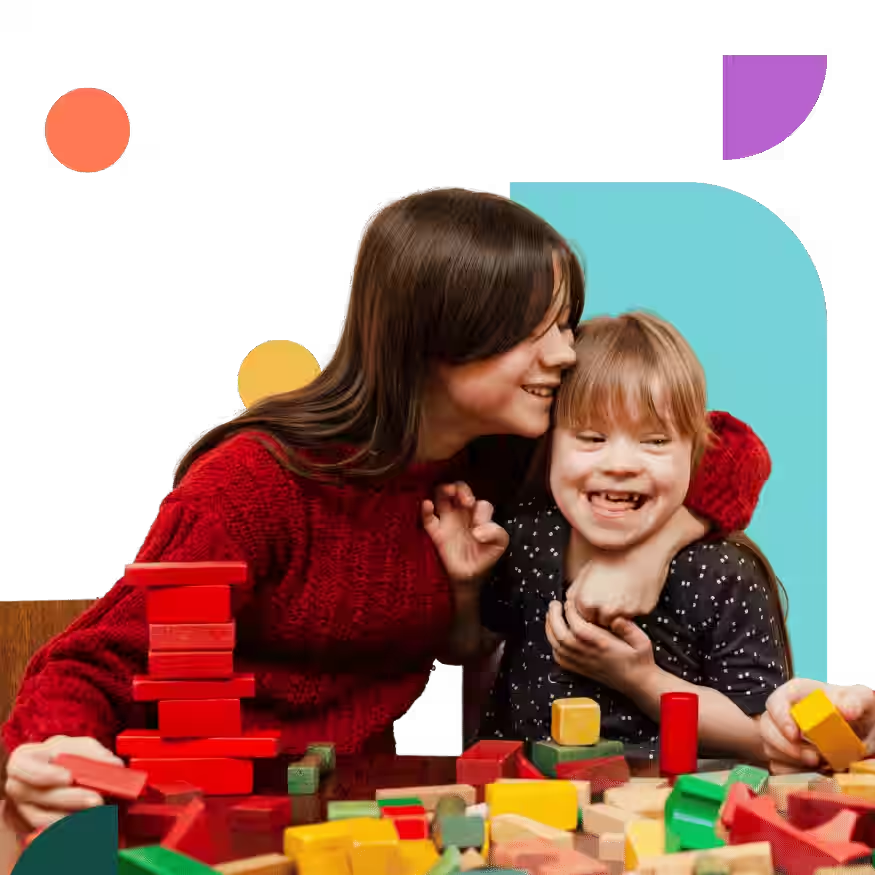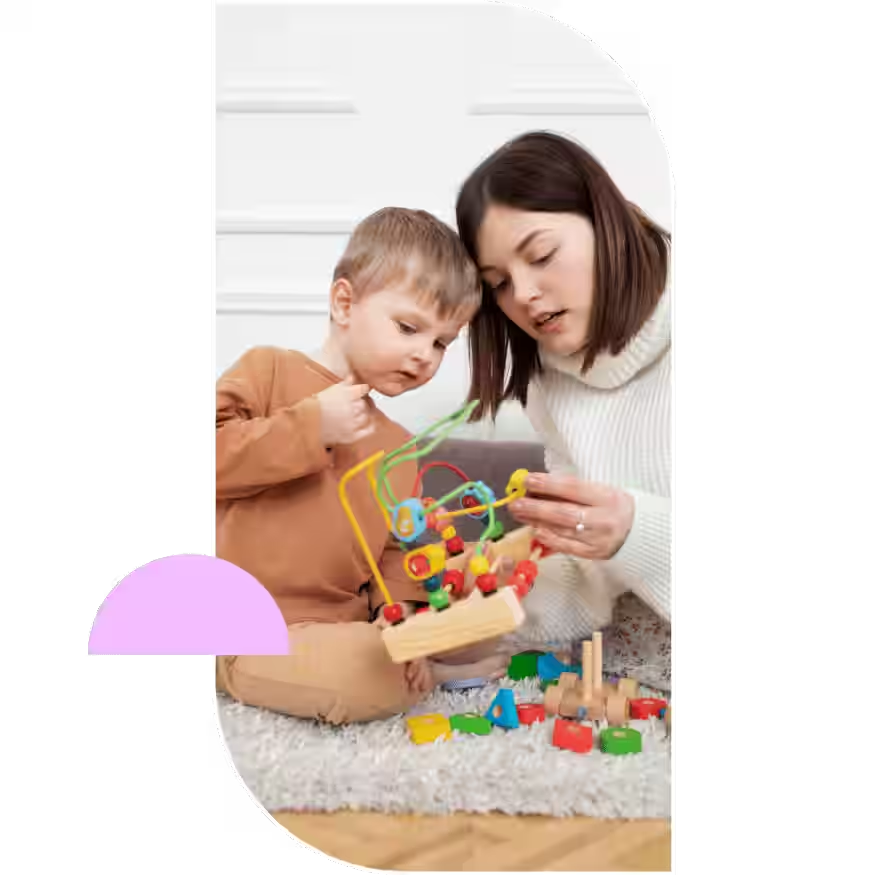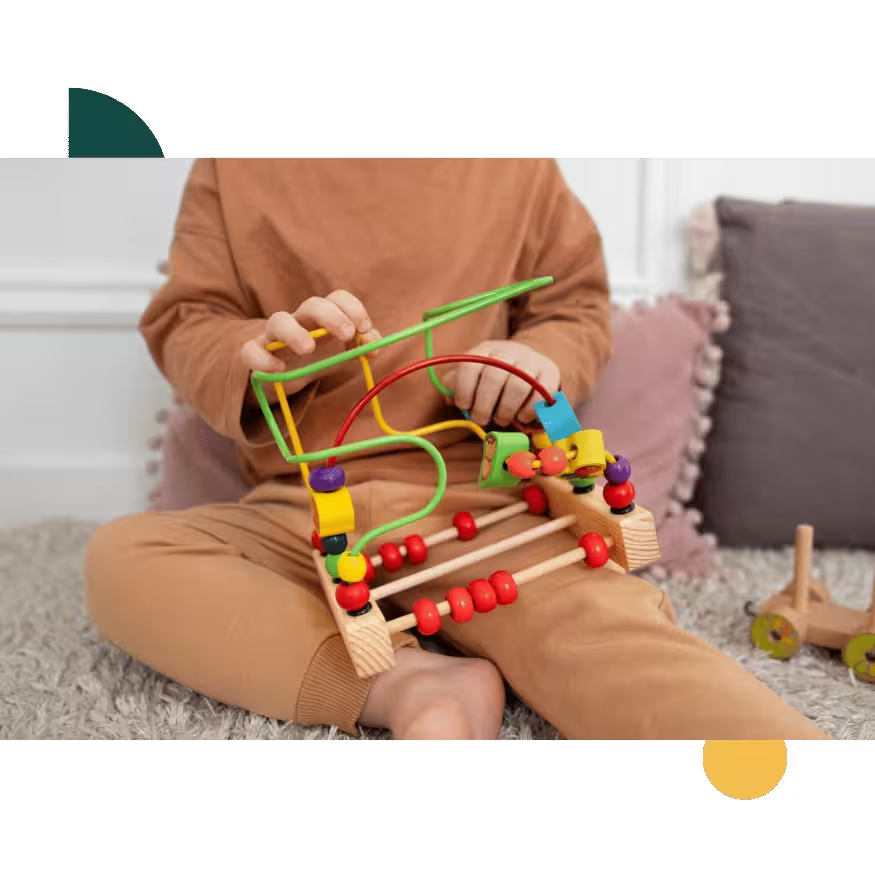Applied Behaviour Analysis (ABA) Therapy
Applied Behaviour Analysis (ABA) — also known as applied behavior analysis ABA — is an evidence based approach used across Australia to help children and those in the autism spectrum disorder ASD build meaningful skills that improve their overall quality of life.
Our programs combine positive behaviour support, structured teaching, and compassionate care to help children communicate better, manage emotions, build independence, and thrive in home, community, and educational settings. Fully supported by NDIS funding, NDIS ABA therapy, and suitable for children needing behavioural therapy for kids.
At daar, we provide modern, ethical early intervention ABA, autism early intervention, and personalised ABA programs for children delivered by qualified behavioural therapists and experienced behaviour support practitioners.

What Is ABA Therapy?
ABA is a structured, science-backed method focused on teaching children how to learn, communicate, and solve problems. Through reinforcement, modelling, and step-by-step guidance, ABA builds essential skills that support independence and long-term growth. Our evidence-based ABA approach supports children with ASD, developmental delay, or challenging behaviours that affect learning, relationships, and participation.
ABA focuses on:
- Strengthening communication using ABA for communication skills
- Improving social interaction with ABA for social skills
- Developing early learning, attention, and problem solving
- Supporting emotional regulation
- Helping children succeed in educational settings
- Building independence in everyday routines
- Guiding family members to support ongoing learning
- Designing interventions that reduce challenging behaviours respectfully and effectively
Our team uses functional behaviour assessments to understand behavioural triggers, learning patterns, and what supports your child best. This ensures therapy is individualised, ethical, and connected to your child’s goals.


Our goal is simple: to build your child’s practical toileting skills with sessions that are intentional, measurable, and aligned with your family’s goals.
Who Benefits From ABA Therapy?
ABA therapy supports:
- children with ASD
- Children with developmental delays
- Kids struggling with behaviour, emotional expression, or social connection
- Children who need structured support for independence
- Students needing help to engage in educational settings
- Families looking for early support, including early intervention ABA
- Children already receiving allied health such as occupational therapy but needing behaviour-focused support.
ABA is effective for toddlers, young children, and older children — especially during the crucial early years.

What ABA Therapy Helps Develop
.svg)
Communication & Language
.svg)
Social & Play Skills

Daily Living
.svg)
Emotional Regulation
.svg)
Learning Readiness
Classroom participation; staying focused during therapy sessions; completing tasks; building confidence in learning routines.
Every skill is tracked, measured, and aligned with your child’s NDIS goals.
How ABA Therapy Works at daar
1. Initial Consultation
We learn about your child, your goals, your routines, and your NDIS plan. You’ll understand how Applied Behaviour Analysis, behaviour intervention, and early supports can help your child.
2. Functional Behaviour Assessment (FBA)
A clinician conducts a full functional behaviour assessment to identify strengths, behaviour triggers, learning barriers, and opportunities for growth.
3. Personalised ABA Program
Your child’s plan includes:
- Skill-building targets
- Strategies to reduce challenging behaviours
- Reinforcement plans
- Customised learning structure
- Milestones and goals
No cookie-cutter programs — ever.
4. Therapy Delivery
Therapy is delivered through flexible models:
- Home-based support
- Clinic programs
- School and educational support
- Community learning
- Telehealth
Sessions typically range from 10–25 hours weekly. Every session is structured, supportive, and meaningful.
5. Progress Monitoring
We monitor every session, track growth, and adjust your child’s plan to ensure ongoing improvement.
6. Parent & Family Training
We coach family members so they can support learning at home. Parent involvement strengthens outcomes and builds confidence for everyone.
Where ABA Therapy Happens
Clinic-Based ABA Therapy
Our clinic spaces are designed to be calm, welcoming, and child-friendly. Each room includes supportive visual tools, developmental resources, and equipment—such as toddler seating and sensory materials—to help children feel safe and comfortable from the very first session. We provide structured learning, fewer distractions and opportunities for social development.
Mobile (Home/School/Childcare)
Many routines and behavioural skills are best learned where your child spends most of their day. Our mobile service brings therapy directly to your home, school, or childcare setting to support real-life learning and consistency. Whether we’re working on daily living routines, toileting, emotional regulation, communication, or behaviour strategies, delivering therapy in natural environments helps your child practise skills in the moments that matter most.
Telehealth (Parent Coaching & Review)
Telehealth is a convenient option for quick check-ins, parent coaching, reviewing your home setup, or making small adjustments between in-person sessions. It’s simple to use, cost-effective, and ideal for families who need flexible support throughout the week. Telehealth ensures you stay connected with your therapist, receive timely guidance, and continue progressing toward your goals—no matter how busy life gets.
ABA Therapy and the NDIS
ABA is typically funded through:
- NDIS funding
- Capacity Building – Improved Daily Living
- Core Supports – Assistance with Daily Life
We assist with:
- Reports
- Behaviour support plans
- Progress notes
- Letters of support
- Service quotes
- Ongoing communication with NDIS teams
Our team makes the process smooth, clear, and stress-free.
.png?width=1125&height=1125&name=DAAR%20LOGO%20(24).png)
Start ABA Therapy With daar
Every child deserves the chance to succeed, grow, and feel confident. Our integrated ABA programs support learning, communication, independence, and positive routines — helping children and family members experience real progress in everyday life. — Book a consultation now.
Frequently Asked Questions:
What is ABA therapy and how does it work?
ABA therapy (Applied Behaviour Analysis) is an evidence-based approach that helps autistic children, children with ASD, and those with developmental delays improve communication, behaviour, learning, and independence. It works by breaking skills into small steps and teaching them through structured therapy sessions, positive reinforcement, and consistent support across home, school, and community environments.
ABA uses tools like functional behaviour assessment, positive behaviour support, and tailored learning plans to reduce challenging behaviours, strengthen communication, and improve overall quality of life for both the child and their family members.
What skills does ABA therapy help develop?
ABA supports a wide range of skills including: Communication skills; Social skills; Emotional regulation and coping strategies; Daily living skills like toileting, dressing, and routines; Problem solving, flexibility, and school readiness; Behaviour intervention to reduce challenging behaviours; Independence in real-world and educational settings
Programs often include ABA for communication skills, ABA for social skills, and tailored goals for children with ASD.
Is ABA therapy effective for autism?
Yes. ABA therapy for autism is one of the most researched and validated therapies for autism spectrum disorder (ASD) worldwide. It helps autistic children build communication, emotional, and social skills while addressing challenging behavior respectfully and safely.
ABA is recommended for: Autism early intervention; Children who need structured support; Kids requiring behaviour-focused learning; and families wanting measurable progress and improved daily functioning.
It improves independence, learning, and behaviour across home and school environments.
How many hours of ABA therapy does my child need?
Most children take part in 10–25 hours per week of ABA depending on age, goals, developmental needs, and whether they are receiving supports like occupational therapy.
Early learners (ages 2–6) often benefit from higher frequency, while older children may need fewer hours but more targeted sessions.
Your clinician sets an appropriate recommendation after a functional behaviour assessment.
What age is best to start ABA therapy?
The most effective time to start is during early intervention ABA, typically between ages 2–7. However, ABA is beneficial for autistic children, teens, and older children who need support with communication, emotional regulation, or independence.
There is no “too late” — ABA is tailored for children with ASD at every stage.
Call Us
-
NDIS Autism Support in Austral
-
NDIS Autism Support in Bankstown
-
NDIS Autism Support in Bass Hill
-
NDIS Autism Support in Cabramatta
-
NDIS Autism Support in Campsie
-
NDIS Autism Support in Canterbury
-
NDIS Autism Support in Carlton
-
NDIS Autism Support in Hurstville
-
NDIS Autism Support in Kingsgrove
-
NDIS Autism Support in Kogarah
-
NDIS Autism Support in Liverpool
-
NDIS Autism Support in Mortdale
-
NDIS Autism Support in Narwee
-
NDIS Autism Support in Punchbowl
-
NDIS Autism Support in Revesby
-
NDIS Autism Support in Riverwood
-
NDIS Autism Support in Rockdale
-
NDIS Autism Support in Campbelltown
Get access to quality, Efficient, and professional care.
Request a call to find out how daar can help you achieve your health goals.
Leading source of information for allied health news, studies and resources.
We support you to be self-determined and independent, giving you the control and freedom to achieve your individual goals
We provide superior quality, client-centric and innovative treatment to support you to realise your full potential


















